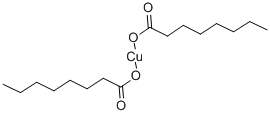Chemical Properties
Blue liquid. Acidic odor; Lardy/fatty odor
Potential Exposure
A copper soap fungicide that controls many common diseases on vegetables, fruits and Copper Octanoate 913 ornamentals, both indoors and outdoors. Treats mildew, including powdery mildew, fruit rots, blue mold, downy mildew, leaf spots, blights, white rust, apple scab, and anthracnose.
First aid
Management of poisonings by ingestion of coppercontaining fungicides depends entirely on the chemical nature of the compound: the strongly ionized salts present the greatest hazard; the oxides, hydroxides, oxychloride, and oxysulfate are less likely to cause severe systemic poisoning. If this chemical gets into the eyes, remove any contact lenses at once and irrigate immediately for at least 15 minutes, occasionally lifting upper and lower lids. Seek medical attention immediately. If this chemical contacts the skin, remove contaminated clothing and wash immediately with soap and water. Seek medical attention immediately. If this chemical has been inhaled, remove from exposure, begin rescue breathing (using universal precautions) if breathing has stopped, and CPR if heart action has stopped. Transfer promptly to a medical facility. When this chemical has been swallowed, get medical attention. Give large quantities of water and induce vomiting. Do not make an unconscious person vomit. Give water or milk as an anticorrosive as soon as possible to dilute the toxicant and mitigate corrosive action on the mouth, esophagus, and gut. Charcoal has not been widely studied in metal poisonings as an effective adsorbant.
Shipping
UN3082 Environmentally hazardous substances, liquid, n.o.s., Hazard class: 9; Labels: 9-Miscellaneous hazardous material, Technical Name Required.
Incompatibilities
Esters are generally incompatible with nitrates. Moisture may cause hydrolysis or other forms of decomposition. Incompatible with oxidizers (chlorates, nitrates, peroxides, permanganates, perchlorates, chlorine, bromine, fluorine, etc.); contact may cause fires or explosions. Keep away from alkaline materials, strong bases, strong acids, oxoacids, epoxides
Waste Disposal
Copper-containing soluble wastes can be concentrated through the use of ion exchange, reverse osmosis, or evaporators to the point where copper can be electrolytically removed and sent to a reclaiming firm. If recovery is not feasible, the copper can be precipitated through the use of caustics and the sludge deposited in a chemical waste landfill

